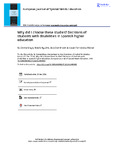Why did I choose these studies? Decisions of students with disabilities in Spanish higher education

Not available until 9999-99-99
Use this link to cite
http://hdl.handle.net/2183/40745Collections
- Investigación (FEDU) [938]
Metadata
Show full item recordTitle
Why did I choose these studies? Decisions of students with disabilities in Spanish higher educationDate
2024-12-22Citation
Mayo, M. E., Aguirre, A., Doménech, A., & Fernández-Menor, I. (2024). Why did I choose these studies? Decisions of students with disabilities in Spanish higher education. European Journal of Special Needs Education, 1–17. https://doi.org/10.1080/08856257.2024.2445405
Abstract
[Abstract] The choice of higher education studies is a key moment for students with disabilities. In this line, the progressive increase in the number of students with disabilities at Spanish universities implies an imminent need to delve further into the reasons that have led them to choose university studies. A total of 91 university graduates with disabilities from different Spanish universities participated in this study. The data were obtained through semi-structured individual interviews and, subsequently, a mixed methods analysis was carried out. On the one hand, the obtained qualitative results indicate that decision-making is mainly based on personal interest. A significant proportion of respondents also referred to other factors, including family, disability and specialisation. On the other hand, the quantitative results define significant associations between various factors, such as gender, type of disability and area of expertise. In conclusion, these results are relevant in terms of guaranteeing the university success of students with disabilities, since, although the choice of degree is a complex issue due to the diversity of factors involved, having this information would allow universities to anticipate in order to favour their vocational development.
Keywords
Motives
Decision-making
Disability
Higher education
Decision-making
Disability
Higher education
Description
This work was supported by the Ministry of Science and Innovation of Spain, State Research Agency and FEDER.
Editor version
Rights
© 2024 Informa UK Limited, trading as Taylor & Francis Group
ISSN
1469-591X





